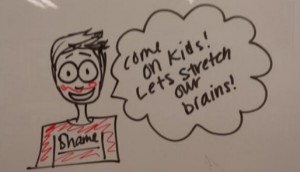Past
If you’re like me, you enjoy teaching, and you enjoy finding cool new ways to help kids learn. Specifically, I teach math. Learning math can be a struggle. I know that teaching it is!
In my experience teaching, I have tried new tricks, I have tried to make math more engaging, and in my student teaching days I even rapped about it (probably something I should bring back). With all of these attempts I still found that my students that “cared” worked hard and found success, and those that “didn’t care” struggled to learn or be engaged at any time.
Along comes growth mindset – a new idea. I like new ideas. I burn through more of them than the average person, but I find triumph in trying something that most people haven’t – even if the idea crashes and burns. And trust me, they’ve burned.
I began my experience learning about growth mindset in a free online course I took through Stanford one summer, How to Learn Math. In the course they presented math as the meaningful connection of ideas and conjectures, and it emphasized the importance of students modeling and sharing their experiences with these ideas. Most importantly, it emphasized the importance of failure and the importance of making (and sharing) mistakes.
In the course, I was introduced to Carol Dweck and her work with growth mindset. I was intrigued by her research, and the following year, I began to use the language in my classroom. I embraced the mistakes that students made and tried my best to use language that would help foster a growth mindset. Half way through the year I started to question whether this new idea was all it was cracked up to be. I found myself saying, “Is anyone even listening?” I still had those go-getters that were finding success, and I still had those strugglers having difficulty. Perhaps this was yet another crash and burn, which is pretty standard in room 253.
And then, this happened.

It was not uncommon for student to make sketches of me. In fact, I recall one class period where a student drew normal Ulrich, skinny faced Ulrich, fat faced Ulrich, monkey Ulrich, and even Ulrich as a banana. I know, I’m inspirational.
What was different about this was what the student quoted me saying. When this student decided to draw a picture of me, rather than saying something mathy, I was encouraging students to work hard and stretch their brains. I got one of those warm fuzzy feelings. They’re listening! This growth mindset thing actually gets through those ears! On a side note, this class also liked to yell “SHAME!” every time I made a mistake on an answer key or in the notes and that also appeared in the drawing. We’re working on that…
Present
To start this school year, I decided to focus on developing growth mindset in my students early and never let them forget it. We worked more as a group and I emphasized the importance of collaboration and using each other to find mistakes. As the year progressed I found myself saying a lot of the same lines to encourage students to change their mindset. Here are a few:
“Worse case scenario you get it wrong and learn something”
– I use this when students are reluctant to share their work.“That is the PERFECT wrong answer. Thank you.”
– I think it is important to be as excited about incorrect answers as the correct one.“Awesome! Guys, let’s check out this mistake.”
– I like finding mistakes and then sharing it with the class. It goes a long way to make people comfortable with making mistakes. As an added bonus, learning occurs!“How are you supposed to stretch your brain if everything is easy?”
-This is a good response when students are complaining that something is too difficult.“I made it difficult so that you can actually learn something”
-Even the brightest students with a fixed mindset can be annoyed by challenges. As teachers we want to push students and this phrase I’ve use a lot with honors students.
Growth Mindset In Action

Let me tell you about a recent situation I encountered. I have an honors geometry student that is just the best. She works hard, asks questions, comes in outside of class when extra help is needed, and truly cares about understanding math. You might even say she has a growth mindset, and yet, last week math class made her utter, “I’m so sick of school”.
What did it take? She earned a B- on a test with a few essential skills also incomplete. She worked really hard to prepare for the test and still came up with less than she hoped. It’s not the first time I’ve heard the phrase, and I know it won’t be the last. What would be your response?
“Keep working hard! You’ll do better next time!”
“Earning a B- is not bad! That’s still a really good grade!”
“You get an A for effort in my book.”
The problem I have with each of these approaches is that it brushes off the learning that actually occurred. This student worked really hard and, yes, she came up short, but why not focus on what she did learn? Here was my approach as soon as she said, “I’m so sick of school”.
Response #1: Let’s find your mistakes.
I took the time to look over her test with her. What we found was that she was very skilled in visualization and breaking down shapes into more manageable pieces. She was persistent in solving difficult problems and took many approaches in order to find the solution.
On the contrary, her struggles were very small. She forgot to use pi in a few problems and read too quickly, misreading the numbers given. Her struggles and stressful B- assessment came down to a few silly errors.
Response #2: Look at all you learned. You didn’t know how to do any of this two weeks ago!
Taking the time to point out all of the concepts she understood took 90 seconds out of my day, but did a world to show this student that her hard work did, in fact, pay off.
Future
Recently I read an article shared by a colleague, and it rewired the way I think about growth mindset.
“It seems the growth mindset has run amok. Kids are being offered empty praise for just trying. Effort itself has become praise-worthy without the goal it was meant to unleash: learning.”
The article challenges the average proponent of growth mindset, forcing them to rethink the way in which growth mindset manifests itself in the language, curriculum, and assessments of their class. After reading it, I boiled implementing growth mindset into these four questions:
1. What specific language do you use to encourage growth mindset?
-Do you value mistakes?
-Do you value struggle over speed?
-Share your growth mindset language with the hashtag #growthlanguage
2. How do we model the process for students?
-If we ask students to embrace mistake and overcome struggles we should probably being doing it too. What does that look like in your classroom?
3. How do we create a system that allows for a growth mindset?
-How can we value mistakes and struggle if we don’t give students a chance to fix them and learn form them?
-Telling kids they can succeed but not giving them the support or tools to get there is something we probably do but need to change.
4. How can you demonstrate to students they are learning and growing?
– Think about the student that says, “I hate school.” How can you show them that all of the work they are doing is paying off? I’m not talking about the gradebook or even pre-test/ post test. How can we connect their struggles and effort to their success, however small it may be?
These are the questions I hope to answer moving forward. Being mindful of them and working toward progress is where I’m at now. I’m sure crashing and burning is still in my future, and, yes, I still will have some students that care and some that don’t, but I’ve noticed an overall change in my kids. They’re growing; they’re working hard and persisting through struggles more than they did at the start of the year. I’ll count that as a win.
